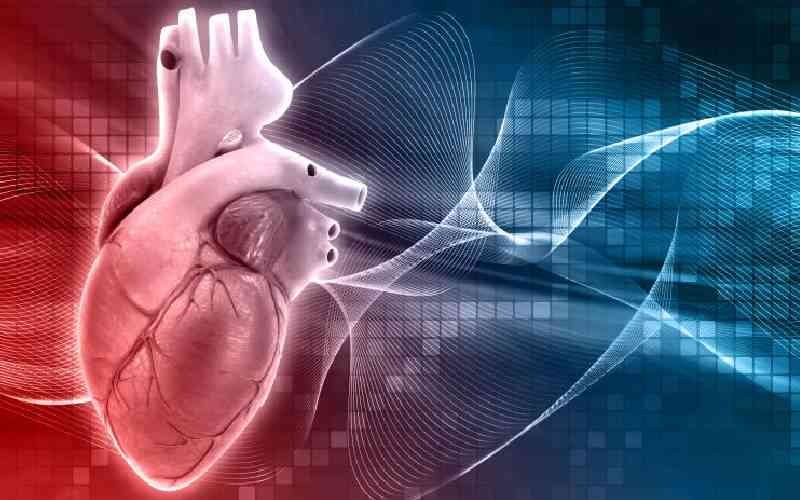What Causes a Hole in the Heart and How is it Treated?

The heart is the powerhouse of the entire body, pumping blood into every cell. Even the slightest problem in the heart can lead to significant repercussions resonating throughout the body. But what if a person is born with a defect in their heart, like a hole in the heart?
A septal defect is a congenital condition present in the person at the time of his birth. A hole in the heart is known to impede the natural working of a human heart by altering the blood flow inside the heart.
Globally, congenital heart defects, including these heart openings, affect approximately 1 in every 100 newborns, emphasizing the need for understanding and awareness. The question is, what causes a hole in the heart, and what treatments are available for filling up the hole? Here is an article that addresses the congenital condition of septal defects or holes in the heart.
What Causes A Hole In The Heart?
A hole in the heart, also known as an atrial or ventricular septal defect, can stem from various factors, presenting as a congenital condition or developing later in life. The following factors cause this hole:
a) Congenital Factors
Genetic Influences: Certain genetic factors contribute to the formation of heart holes.
Maternal Health: The health of the mother during pregnancy plays a role.
b) Environmental Factors
Medication or Substance Exposure: Certain substances taken during pregnancy may increase the risk.
Infections: Maternal infections during pregnancy can impact fetal heart development.
c) Acquired Factors
Cardiac Conditions: Conditions like high blood pressure or heart attacks may lead to hole development.
Injuries or Trauma: Physical trauma to the chest area can result in a hole.
Understanding these factors is crucial for early detection and informed management of this common heart condition.
Dr. Dinesh Mittal specializes in treating congenital heart conditions, including holes in the heart. With a wealth of experience and expertise, Dr. Mittal provides comprehensive care, offering tailored solutions such as surgical interventions and catheter procedures. His commitment to advancing cardiac health ensures patients receive optimal treatment and support for a healthier heart.
How Is It Diagnosed?
Diagnosing a hole in the heart involves a comprehensive evaluation by healthcare professionals using techniques and assessments. This may include:
- Physical Examination: A thorough examination by a healthcare provider to detect potential signs and symptoms.
- Imaging Tests: Utilization of imaging tools, such as echocardiograms, to visualize the heart’s structure and identify any abnormalities.
- Echocardiography: A painless device that uses sound waves to create an image of the heart.
- EKG: A device that records the heart’s electrical activity.
- Chest X-ray: X-rays take pictures of the inside of a person’s body, revealing any discrepancy.
- Pulse Oximetry: It is a device that calculates the amount of oxygen in the blood.
- Cardiac Catheterization: A small flexible tube is inserted into the veins through an arm, groin, or neck and is then threaded to the heart. A dye is added to the blood flow, which the doctors monitor for abnormal flow.
- Routine Check-ups: Asymptomatic cases are often detected during routine check-ups, underscoring the importance of regular health assessments for timely diagnosis.
How Is It Treated?
Treating a hole in the heart depends on factors like the size of the opening, its location, and the individual’s overall health. The following are the available treatment options:
Observation and Monitoring:
Small Holes: Healthcare professionals may recommend a watchful waiting approach with regular check-ups for asymptomatic and small openings.
Medications:
Heart Medications: Some medications help manage symptoms, control blood pressure, and prevent complications associated with heart holes.
Surgical Intervention:
Patch Closure: Larger holes or those requiring intervention may involve surgical procedures to close the opening using patches or stitches.
Catheter Procedures: Minimally invasive catheter-based techniques, like device closure, can be utilized for specific holes.
Lifestyle Modifications:
Healthy Living: Adopting a heart-healthy lifestyle, including regular exercise, a balanced diet, and avoiding tobacco and excessive alcohol, is crucial for overall well-being.
Personalized Treatment Plans:
Treatment plans are personalized based on individual factors, and decisions are made in consultation with healthcare professionals to ensure the most effective and suitable approach.
Dr. Dinesh Mittal emphasizes, “Effective treatment for a hole in the heart is pivotal for ensuring optimal heart health. Surgical interventions like patch closure or minimally invasive catheter procedures are crucial in closing the opening. These treatments not only address immediate concerns but also promote long-term cardiac well-being. With personalized approaches and advancements in medical science, we can provide patients with the best possible outcomes, allowing them to lead healthier and fulfilling lives.”
“Dr. Dinesh Mittal’s expertise in treating my child’s heart defect was a blessing. His thorough explanations and compassionate approach reassured us throughout the journey. The surgical procedure was a success, and we are grateful for the comprehensive care Dr. Mittal and his team provided.” – Anita Rajput
“After being diagnosed with a heart hole, Dr. Mittal’s personalized treatment plan and the minimally invasive catheter procedure made the process smoother than I anticipated. The team’s professionalism and Dr. Mittal’s expertise instilled confidence, and I am now on the path to a healthier heart. Highly recommended!” – Rajesh Sharma
How Much Does It Cost To Treat A Heart Hole (Atrial Or Ventricular Septal Defect) In India?
Below is an approximate breakdown of the cost of treating a hole in the heart (atrial or ventricular septal defect) in India:
| Procedures | Cost Range (in INR) | Cost Range (in USD) |
| Medications | ₹1,000 to ₹5,000 per month | $14 to $70 per month |
| Surgical Intervention (Patch Closure) | ₹1,00,000 to ₹5,00,000 | $1,400 to $7,000 |
| Catheter Procedures (Device Closure) | ₹1,50,000 to ₹6,00,000 | $2,100 to $8,500 |
| Cardiac Catheterization | ₹50,000 to ₹2,50,000 | $700 to $3,500 |
| Diagnostic Tests (Echocardiography, EKG, Chest X-ray) | ₹5,000 to ₹20,000 | $70 to $280 |
Note: These approximate costs vary significantly based on individual cases and the healthcare provider. Additionally, these figures do not include additional costs such as preoperative and postoperative care, medications, and potential complications. Patients are advised to consult with healthcare providers for personalized cost estimates.
Conclusion
Understanding the causes, signs, and treatments for a hole in the heart is essential for proactive healthcare. From congenital factors to lifestyle modifications, the journey involves early detection and personalized treatment plans prioritizing immediate concerns and long-term cardiac health.
Frequently Asked Questions
-
Can a hole in the heart heal on its own?
Sometimes, small holes may close on their own, but larger ones often require intervention.
-
Is a hole in the heart always present at birth?
No, it can develop later in life due to various factors.
-
Are all heart holes symptomatic?
No, some individuals may not exhibit noticeable symptoms, and detection may occur during routine check-ups.
-
Can lifestyle changes alone treat a hole in the heart?
While a healthy lifestyle is crucial, larger holes may require medical intervention.
-
Is every hole in the heart treated with surgery?
Smaller holes may be monitored or managed with medications, and surgical intervention is reserved for specific cases.
Read More : What Are the Benefits and Risks of Senning’s-Truncus Repair for Infants?
